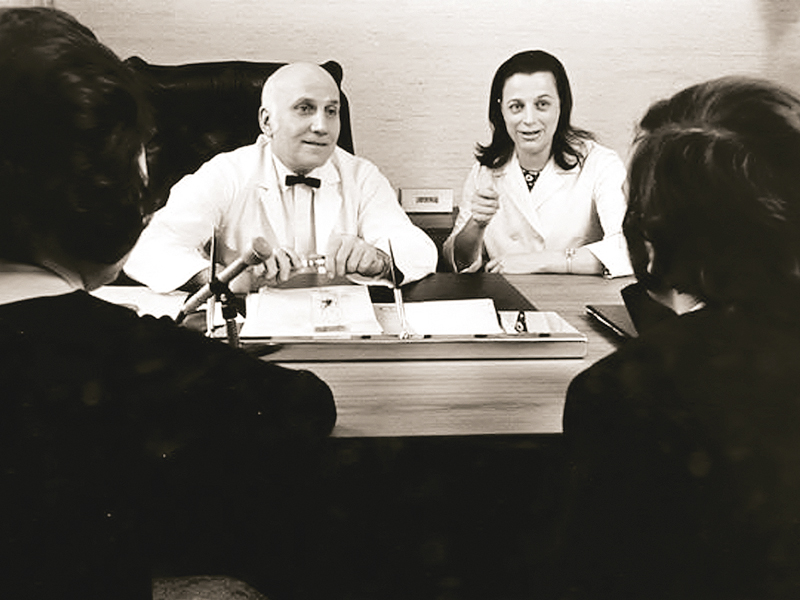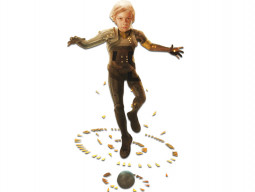
Given the sensitivity of the topic and print media restrictions in respect of our readers, I will be steering clear of the title of the series and language that may ruffle some feathers. As you can see, Pakistan of the 2000s is quite like America of the 1950s in some ways.

What I will tell you, though, is that this Showtime television series is based on Thomas Maier’s book Masters of [...]: The Life and Times of William Masters and Virginia Johnson, the Couple Who Taught America How to Love. The book explores the way expert gynaecologist Dr William H Masters, working at Washington University in St Louis, Missouri (the conservative mid-West), undertook research with the help of his secretary Virginia Johnson, who didn’t even have a college degree at the time.
Until the Masters and Johnson research appeared in a book in 1966, the American understanding of the female response in the bedroom was beset by certain misperceptions. One researcher, Alfred Kinsey, had done some work, but it was based on questionnaires and not hard science. Dr Masters wanted to measure the biological response of the female species during the act.
He and Virginia found, among other things, that female pleasure or lack of it was linked to things like self-esteem, anxiety or a communication gap with their partner.
The tasteful execution of a controversial subject is the show’s strongest selling point. Though everything is shown openly; the aim is not to titillate or insert gratuitous material. The goal is to shed light on the science of this most fundamental of human functions, show how women’s roles were perceived in and outside a marriage and how men factor into this entire equation.
So, for example, the show’s Emmy-award winning scriptwriter, Michelle Ashford, takes on the taboo of infertility. Even today in Pakistan, our first assumption is that if a couple cannot have a child, there must be a fault with the woman. In the series, Dr Masters’ wife, Libby is shown to undergo painful treatments in order to conceive even though the real problem actually lies with the husband. So what does this mean in a world where a woman is considered incomplete if she doesn’t reproduce?
Life is not much easier for women who have had children. The show’s main character, Virginia, is divorced with two children. But such was the environment in the 1950s that when she tried to sign up for courses at the university, the librarian, an older woman, tried to dissuade her. She told Virginia that her place was at home with her children. Indeed, the debate of the working woman versus the housewife persists in Pakistan today; but in many cases it is forgotten that in order for a woman to enter a higher salary bracket, she has to invest time in formal education or degrees, which will mean time away from her children.
The show also tries to untangle the moral questions surrounding the issue of a woman’s right to decide what to do with her body. In Pakistan on a more visible level, violence against women manifests itself by physical harm to a woman’s body. Take the rape, beatings and acid attacks. On a less visible level, women’s bodies are controlled by men when it comes to their decisions to plan their family. Similarly, in this television series, one of the characters, a female sex worker, helps Dr Masters with his research by providing her girls as subjects. But when she asks the doctor, who is also her gynaecologist, to untie her tubes, so she can have children, he refuses. He cites her unconventional life choices and economic instability as the reasons. In the end, though, the question is whether this woman has a right to make her own decisions?
In Pakistan we may not openly discuss such intimate matters, and may only perhaps allude to them in our own television dramas, but at the end of the day the subject of reproduction, fertility, infertility and disorders merits some study given how intrinsic it is to a well-fulfilled life, indeed our personal happiness.
Rating:
Mahim Maher is an editor at The Express Tribune. She tweets @Mahim_Maher
Published in The Express Tribune, Sunday Magazine, December 22nd, 2013.
COMMENTS (1)
Comments are moderated and generally will be posted if they are on-topic and not abusive.
For more information, please see our Comments FAQ


















1713904359-0/burn-(1)1713904359-0-270x192.webp)
















1713853507-0/MalalaHilary-(2)1713853507-0-270x192.webp)







What an awesome 1st season it was !! Apart from the gratuitous nudity, it packed some solid performances particularly from the lead pair. The soap opera element is engaging as well. I want to Congratulate its director for execution of a taboo topic so brilliantly. . .
Eagerly waiting for the second season !